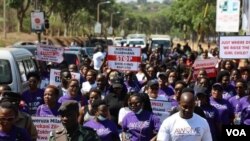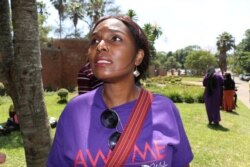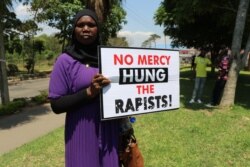Clad in purple and white T-shirts, the female journalists carried placards calling for stringent measures against sexual offenders, with some calling for castration.
Edith Kambalame is the chairperson of the Association of Media Women in Malawi, which led the protests in Blantyre
“As journalists we are saying we’ve been reporting on issues of rape and defilement for long, long time, but we are seeing little impact on the ground," Kambalame said. "We are acknowledging effort the police are putting in place, the courts, and we also know that there are laws in place, but we believe that if these issues are continuing, then probably they [laws] are not stringent enough.”
Some recent cases have brought attention to the ongoing problem of rape and sexual abuse in Malawi.
Last week, police arrested a 38-year-old man in the southern district of Chikwawa after he allegedly raped an 11-year-old girl, then dumped her along the side of the road.
Police in Blantyre recently arrested a senior employee at the Medical Aid Society of Malawi for raping his sister's daughter, just 14 years old.
Peter Kalaya, deputy spokesperson for the Malawi Police service, told VOA the trend is rising.
“For example, in terms of defilement cases — in 2018, the Malawi Police Service recorded a total of 1,539 cases. In 2019, we recorded a total of 1,766, whereas in 2020, between January and September, we have recorded a total of 1,501 cases," Kalaya said. "Meaning that by the time we hit December we’ll have gone beyond 1,766 cases we recorded in 2019.”
The protesters attribute the rise to lenient penalties, which currently allow rapists a maximum jail sentence of 14 years.
Kambalame said that is not enough.
“So, what we are asking in the nutshell is for the policy makers to put in place more stringent measures to facilitate some legal review, to say that those that are proved to have defiled or raped one, should get life imprisonment,” Kambalame said.
Humphrey Mvula, a social commentator and panelist on the TV show “Hot Current,” said these punishments are a little harsh. He said what Malawi needs is better sex education in schools.
"Sex education needs to start from lower classes going up'" Mvula said. "Because look, there are some areas where you find that girls unfortunately may find themselves in a situation, where they may not be properly protected. Possibly you want to join a beer party and then you have individuals who still look at women as objects."
Meanwhile, Minister of Gender Patricia Kaliati said women who choose to press charges of rape or abuse will be provided with a lawyer for free by her ministry. She said the government and various donors are paying for the lawyers.
She adds that the government is drafting a bill that could increase the maximum jail term for convicted rapists to life imprisonment.






